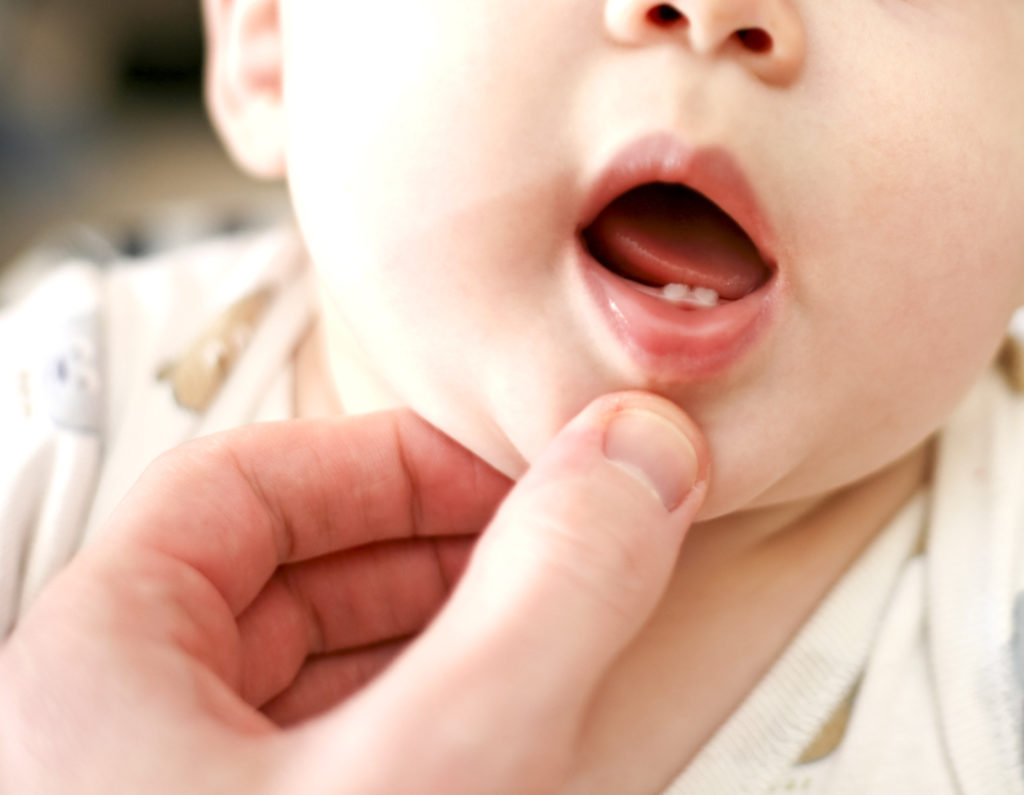At what age does a baby's first tooth appear? How can you tell if your baby is teething? How can you relieve your baby's teething problems? These questions preoccupy all parents during their child's first year of life. As a general rule, the first baby tooth erupts around 6 months after birth. That said, some babies are born with one or two teeth, while in other cases they appear after 12 months. HELVIDENT shares with you dentists' advice on baby teeth.
Forming baby's teeth
Did you know that your baby's tooth buds develop during pregnancy? In fact, the first baby tooth buds appear in the fetus from the 6th week. Eventually, baby's mouth will contain 20 milk teeth, half on the upper jaw and half on the lower jaw.
Around the 3rd month of pregnancy, some permanent tooth buds form below the baby tooth buds. Of course, they will remain hidden in the gums for several months before breaking through.
Oral health during pregnancy
Does a mother's oral hygiene have an impact on her child's? The answer is yes, since the formation of baby's teeth begins during pregnancy. It has been scientifically proven that poor oral hygiene for pregnant women can promote :
- premature delivery
- gestational diabetes
- pre-eclampsia (also known as toxemia gravidarum)
- intrauterine growth restriction
- a predisposition to dental caries
- gaps in baby's tooth enamel
Visit Swiss Society of Dentists recommend that expectant mothers brush their teeth at least twice a day. They should use fluoride toothpaste and clean the interdental spaces. A varied and balanced diet also contributes to the optimal development of baby's teeth.
Ask your dental hygienist in Lausanne, Fribourg or Aigle for advice.
Baby's teeth development after birth
The age at which the first teeth appear varies from child to child. What remains constant, however, is the order in which baby's teeth appear:
- lower central incisors
- then upper central incisors
- lower lateral incisors
- then upper lateral incisors
- lower first molars
- then first upper molars
- first upper canines
- then first lower canines
- lower second molars
- upper second molars
While the 10 primary teeth emerge, the 32 permanent teeth continue to develop in the jaws. On average, they will appear between the ages of 6 and 12. Wisdom teeth are the last to appear, much later. That said, some people don't have any.
Solutions to relieve teething in babies
Like the age at which teeth emerge, pain varies from child to child. In some cases, the emergence of teeth goes unnoticed. In others, it is accompanied by discomfort and crying.
How can you tell if your teeth are coming through?
The main symptoms of erupted teeth are as follows:
- a bluish cyst erupting from the gums
- swollen gums
- redness of the cheeks
- increased salivation
- a tendency to chew and bring the hand to the mouth
- itchy gums
- irritability and restlessness
- easy crying
- lack of appetite
- disturbed sleep and night-time awakenings
However, teething never causes a high fever. If it does, consult your paediatrician.
How to relieve teething problems?
Teething is a natural phenomenon that requires no special care. Nor is there any way to prevent teething discomfort. You can, however, help your child to cope better with the discomfort and pain.
Here are a few simple and effective tips to relieve teething troubles:
- Lightly massage your baby's gums with a clean finger or a clean washcloth soaked in cold water.
- Provide baby with a refrigerated (never frozen) rubber teething ring that complies with current standards.
- Bring comfort with cuddles and small attentions.
- If necessary, give acetaminophen (paracetamol) on your doctor's advice.
We recommend that you avoid giving your child raw vegetables, teething cookies and amber necklaces.
When should you see a doctor?
An appointment with your doctor is necessary when the following symptoms occur:
- fever over 38.5°C
- severe pain
- baby blues
- the presence of unusual signs.
These symptoms may signal an infection unrelated to teething.
HELVIDENT has dentists specialized in children's dental hygiene. Please feel free to schedule a consultation at our dental clinic in Lausanne, Fribourg or Aigle.

